Global Voices contributor Joey Ayoub is sitting at a Cebu café, browsing wantonly through the morning news on his smartphone. I ask him if it would be a good time to exchange a few words about covering Palestine, the narratives in mainstream media and his hope for the region. He nods along and stands up slowly, trying to gather enough energy to discuss a topic that he has written at length about for the past few months.
He is visibly tired; the 2015 Global Voices Citizen Media Summit in Cebu, Philippines, has been thrilling but intense. More so that the summit, it seems that the challenge of writing about topic and people he cares deeply about has taken a toll on him.
Joey is from Lebanon but he also covers Palestine and other Middle Eastern and North African countries for Global Voices. He is also the co-creator of blog Hummus for Thought. The war in Gaza broke out on July 8, 2014, as Israel launched a military operation against the Strip called Operation Protective Edge. The continued shelling of the region resulted in over 2,200 deaths, most of them Gazans. Joey was one of the main authors driving Global Voices’ coverage of the conflict; his report on an Israeli army whistleblower was the most read post on Global Voices in 2014.
Here are his thoughts on writing about the conflict in Gaza and its impact on Gazans and himself.
Global Voices (GV): You wrote extensively on the violence between Israel and Gaza. What was the most challenging aspect of covering the situation for you personally?
Joey Ayoub (JA): It was an emotionally draining task. I wrote an article every two days or so. I have many friends in Gaza and when you see images of deaths, buildings destroyed and someone you know possibly being among the victims, it becomes a daunting challenge to stick to the facts and not less personal feelings take over. I more or less managed to do that, I believe. But the psychological struggle of observing the conflict was demanding so I had to get some help to deal with it.
GV: During the conflict, how did you manage to stay connected with people on the ground?
JA: That was the other challenging aspect of covering this story: staying on top of the news when connection on the ground was disrupted. But there is a very active online community in Gaza and my friends on the ground were well connected as well so I was able to grow my network with all the media producers, local and foreign, in the region. It allowed me to recoup facts and get the story right.
GV: The complexity of the conflict has been well documented. What would you say is the aspect of the conflict that outside observers have the hardest time understanding?
JA: The conflict in Palestine is, in fact, not that difficult to understand but at the same time, it is a daunting challenge to fully comprehend.
Let me explain: It is not difficult because the fact are usually straightforward, undisputed. The occupying forces are known and the occupied population is also identified. Contrary to common belief worldwide, what we witness here is a relatively new, post-WWII conflict (1948), not some ancient war between rival populations. People in the western world often believe that the animosity is born out of centuries-old clashes of civilization, Fukuyama-style and would look at the conflict through a specific geopolitical lens. People in the region do not have this luxury. They face the impact of the conflict and try to deal with it the best way they can. Gazans would try to get international awareness and solidarity about the struggle they face on a daily basis. They do not really care about the geopolitical framing with which the rest of the world tries to explain the causes of the conflict.
So I think this is the hardest part to understand for the rest of the world: the notion of basic self-defense that the occupied population is entitled to (raising awareness and solidarity for the victims) is lost because we try to find a geopolitical cause to the conflict.
GV: Could you explain a bit more that notion of self-defense?
JA: The fact is, the international community considers Israeli settlements in the West Bank illegal under international law and the blockade of the Gaza strip by the Israeli military as an act of occupation. The right to express itself and protest (self-defense) is entrenched in international human rights law in any occupied territories because the occupied residents are subjugated to the control of the occupying power without any access to its political power. However, the concept that Palestinians are allowed to protest the occupation is not even discussed in western media. This is what the Palestinian-American writer Edward Said explains in great length in the concept of “permission to narrate“: the current narrative in the media denies Palestinians the power to communicate their own history.
GV: So the narrative of social justice is missing when we focus on the cause of the conflict, religious or not.
JA: Palestinians will tell you that there were no issues of co-existing between communities in Palestine before 1948. Different communities lived together without problems before but now it is more difficult because of the daily social injustice. There are many other factors that feed the conflict but reducing current sources of injustice in the territories will be more effective in reducing the number of future conflicts than any geopolitical solutions proposed to this day.
GV: How can the media better convey that daily struggle on the ground and help convey more empathy with victims of the conflict?
JA: Our primary objective was to always go back to the facts and repeat them over and over in every post so that no ambiguity remains about what was happening on the ground. The idea was to not let the content of our articles be taken out of context by partisan groups on either sides. Providing the context is key in trying to convey empathy.
Another challenge is that there is a media blockade that prevents the Israeli population from being aware of what is happening in the occupied territories. This is why I have a great deal of respect for Jewish activists who are trying to raise awareness for the Palestinian cause despite the effort of Netanyahu administration to silence them. It takes so much more effort to understand the injustice when context is not easily accessible to you. And it takes even more effort to try to fight this system from within.
On the other hand, Lebanese population and other neighboring countries are well aware of the tragedy in Gaza. When you see the images of the devastation, it becomes quite difficult for them to not make general judgment on the Israeli administration and the people it is suppose to represent. That is why I make it a point to emphasize the work that Jewish activists undertake for the Palestinian population. Their situation is very tenuous and if we are to convey more empathy to the victims of the conflicts, Jewish activists are the epitome of how it can be done. We should support them because they are certainly quite isolated in their own country.
GV: You wrote an article on how Palestinian Twitter users were supporting the protests in Ferguson, Missouri, following the shooting death of a black teenager at the hands of a policeman. We have seen many images of Palestinians displaying empathy with other causes while being under duress themselves.
JA: It was one of the more moving displays I had the chance to cover. The two situations are not quite similar though. In Ferguson, the black communities can say that they are citizens of the USA and that they demand the rights to be treated equally. This is not the case in Palestine. But both communities can relate to the lack of opportunities that they have access to. The support for Ferguson from Palestine happened organically. Many Palestinian activists contributed to the civil rights movement as they navigated similar circles and worked on similar issues. The protests in Ferguson happened shortly after the Gaza conflict so the parallel was easy to make. I would say that the situation in West Bank is probably more similar than the one in Gaza because it is the same type of oppression.
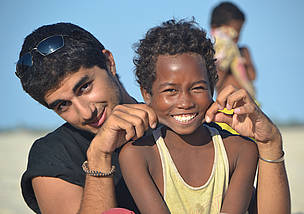
Joey Ayoub with Dafinina in Madagascar with Joey's permission
GV: Final question: you spent a few months in Madagascar and created the page “Humans of Madagascar” during your stay. What was the reason behind your stay there and what did you learned from it?
JA: I was 20, in my second year at American University of Beirut working on a degree in social and conservation studies. The WWF offered a grant to be a volunteer abroad and I was lucky enough to be accepted. I stayed about two months in a charming little village called Ambohibola in southern Madagascar and it was unforgettable. The thing about Malagasy people is that they are very nice regardless of the situation. I was there one year after the coup d'état (in 2009) so things were very unstable but I always felt safe in the village. I hope to be back there soon.
GV: Thanks, Joey! And safe travels.

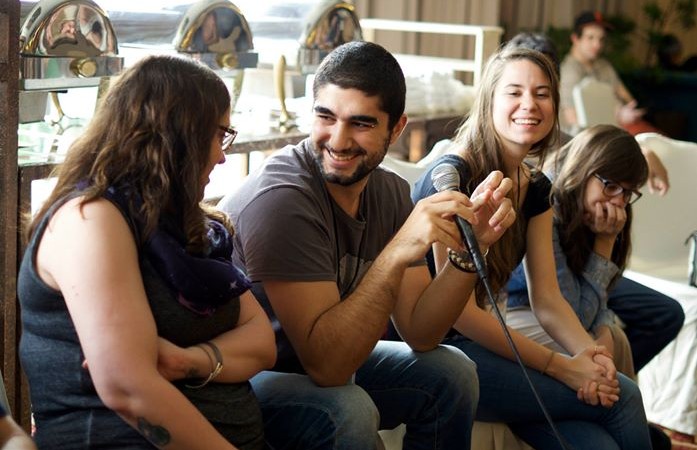
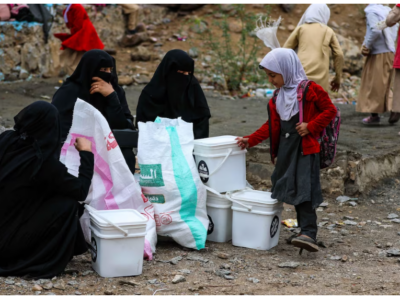
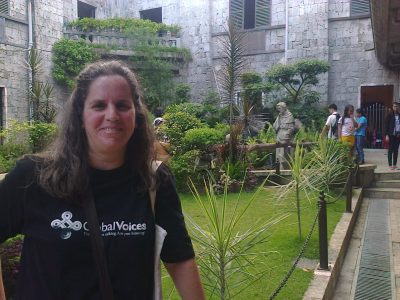
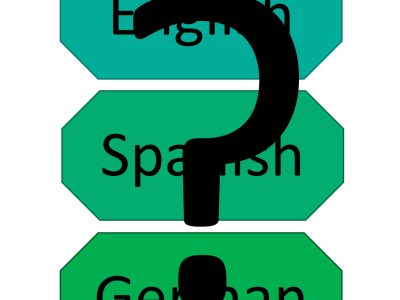
1 comment
Great interview! Thanks Lova and Joey :)